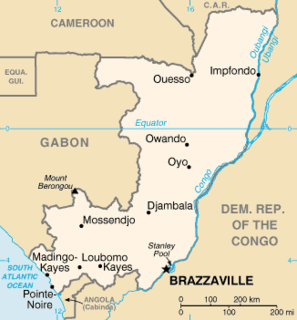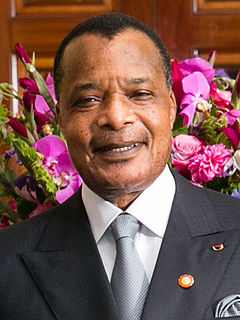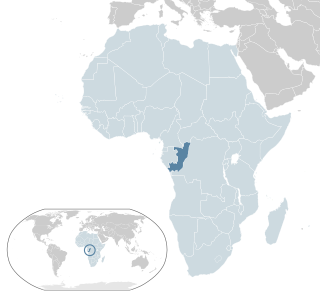This article needs additional citations for verification .(January 2016) (Learn how and when to remove this template message) |
Rugby union in the Republic of the Congo is a minor but growing sport
This article needs additional citations for verification .(January 2016) (Learn how and when to remove this template message) |
Rugby union in the Republic of the Congo is a minor but growing sport
The national union is a member of the Confederation of African Rugby, but not of the International Rugby Board.
Rugby union was introduced into the country by the French, who ruled the country for a number of years.
Rugby is centred on the national capital, Brazzaville. The Congo lacks good transport networks and along with its political instability, civil war, and the extreme poverty of the country, it is difficult for it to maintain a proper national league structure.
Like many African countries, the historical connection with France is a mixed blessing. For a number of years, Congolese rugby players would leave to play there, which deprived rugby in the Congo of any real competition.

The history of the Republic of the Congo has been marked by diverse civilisations: indigenous, French and post-independence.

For the two decades preceding the Republic of the Congo's 1991 National Conference, the country was firmly in the socialist camp, allied principally with the Soviet Union and other Eastern bloc nations. Educational, economic, and foreign aid links between Congo and its Eastern bloc allies were extensive, with the Congolese military and security forces receiving significant Soviet, East German, and Cuban assistance.

Brazzaville is the capital and largest city of the Republic of the Congo. Constituting the financial and administrative centre of the country, it is located on the north side of the Congo River, opposite Kinshasa, Democratic Republic of the Congo. The population of the capital is estimated to exceed 1.8 million residents, comprising more than a third of the national populace, 40% of whom are employed in non-agricultural professions. During World War II, Brazzaville was also the capital of Free France between 1940 and 1942.

Denis Sassou Nguesso is a Congolese politician who has been the President of the Republic of the Congo since 1997. He was previously President from 1979 to 1992. During his first period as President, he headed the single-party régime of the Congolese Party of Labour (PCT) for 12 years. Under pressure from international sources, he introduced multiparty politics in 1990 and was then stripped of executive powers by the 1991 National Conference, remaining in office as a ceremonial head of state. He stood as a candidate in the 1992 presidential election but was defeated, placing third.

AbbéFulbert Youlou was a laicized Brazzaville-Congolese Roman Catholic priest, nationalist leader and politician, who became the first President of the Republic of the Congo on its independence.
The culture of the Republic of the Congo is rich, diverse and made up of a mix of about 4.5 million people in 2015 and just as many languages and customs.

The Republic of the Congo is an African nation with close musical ties to its neighbor, the Democratic Republic of the Congo. The Democratic Republic of the Congo's homegrown pop music, soukous, is popular across the border, and musicians from both countries have fluidly travelled throughout the region playing similarly styled music, including Nino Malapet and Jean Serge Essous. Brazzaville had a major music scene until unrest in the late 1990s, and produced popular bands like Bantous de la Capitale that played an integral role in the development of soukous and other styles of Congolese popular music. The Hip-Hop group "Bisso na Bisso" also hails from Congo-Brazzaville.

Pointe-Noire is the second largest city in the Republic of the Congo, following the capital of Brazzaville, and an autonomous department since 2004. Before this date it was the capital of the Kouilou region. It is situated on a headland between Pointe-Noire Bay and the Atlantic Ocean. Pointe-Noire is the main commercial centre of the country and has a population of 715,334 (2007), expanding to well over 1 million when the entire metropolitan area is taken into account.

The African Games, formally known as the All-Africa Games or the Pan African Games, are a continental multi-sport event held every four years, organized by the African Union (AU) with the Association of National Olympic Committees of Africa (ANOCA) and the Association of African Sports Confederations (AASC).

The Second Republic of the Congo Civil War was the second of two ethnopolitical civil conflicts in the Republic of the Congo, beginning on 5 June 1997 and continuing until 29 December 1999. The war served as the continuation of the civil war of 1993–94 and involved militias representing three political candidates. The conflict ended following the intervention of the Angolan army, which reinstated former president Denis Sassou Nguesso to power.
The Republic of the Congo, also known as Congo-Brazzaville or the Congo, is a country in Central Africa. It is bordered by Gabon, Cameroon, the Central African Republic, the Democratic Republic of the Congo, the Angolan exclave province of Cabinda, and the Gulf of Guinea.

The People's Republic of the Congo was a Marxist–Leninist socialist state that was established in 1969 in the Republic of the Congo. Led by the Congolese Party of Labour, it existed until 1991 when, following the dissolution of the Soviet Union, the country's earlier name was restored and André Milongo was named transitional prime minister.

The Association of National Olympic Committees of Africa is an international organization that unites the 54 National Olympic Committees (NOCs) of Africa. It is currently headquartered in Abuja, Nigeria. It serves as the successor to Standing Committee of African Sports or Comité permanent du sport africain founded in 1965 in Brazzaville, Republic of Congo.

Republic of the Congo–Russia relations refers to bilateral foreign relations between the Republic of the Congo and Russia. The Republic of the Congo has an embassy in Moscow. Russia has an embassy in Brazzaville.

The Republic of the Congo, also known as Congo-Brazzaville, the Congo Republic, RDC, or simply the Congo, is a country located in the western coast of Central Africa. It is bordered by five countries: Gabon to its west; Cameroon to its northwest and the Central African Republic to its northeast; the Democratic Republic of the Congo to the southeast and the Angolan exclave of Cabinda to its south; and the Atlantic Ocean to its southwest. The official language is French.

The African and Malagasy Union (AMU) was an intergovernmental organization created to promote cooperation among newly independent states in Francophone Africa. The organization derives its name from the name of the continent of Africa and from the former Malagasy Republic, now Madagascar. The organization went defunct in 1985.
Rugby union in the Democratic Republic of the Congo is a minor but growing sport.
Mass media in the Republic of the Congo are severely restricted by many factors, including widespread illiteracy and economic underdevelopment.
Adama Smith Dickens is a football midfielder from the Republic of the Congo. She played for 1207 Antalya Muratpaşa Belediye Spor in the Turkish Women's First Football League with jersey number 24. She is a member of the Congo women's national football team.
| This rugby union article is a stub. You can help Wikipedia by expanding it. |